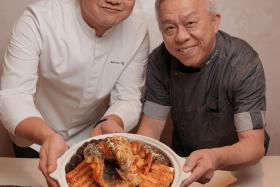Expect to pay even more for CNY goods
Prices of items are hitting 'record' levels: Wholesalers
Brace yourself for a more expensive Chinese New Year this year - with prices of some products ranging from vegetables to seafood set to rise.
Wholesalers and experts The New Paper contacted said the cost price of some food items are hitting "record" levels this festive season because of factors like poor weather and the weakening Singapore dollar.
Popular steamboat ingredient Chinese tang oh, also known as garland chrysanthemum, is costing importers 50 per cent more, said Mr Jerry Tan, assistant secretary of the Singapore Fruits and Vegetables Importers and Exporters Association.
Noting that Guangdong in China is experiencing a warm winter, Mr Tan said: "The quality of traditional tang oh won't be that good as it grows better in cooler weather. There will also be a shortage in supply this year.
"Supply for tang oh from Cameron Highlands in Malaysia will also be affected due to shortage of seeds. Tang oh is likely to be more expensive than last year, and will probably hit record prices this year."
Retailers are seeing a 10 per cent increase in abalone prices because of the reduction of production in several countries - including Mexico, Australia and South Africa.
"Wild abalone production in the past two years fell by around 10 per cent because temperatures around the world are too high, causing a lot of seafood to perish," said Mr Mario Chua, chairman of Victoria Street Wholesale Centre Merchants' Association.
Chicken and duck prices may also increase by 10 to 30 cents per kg because of the hot weather in Malaysia, which has affected egg production, said Poultry Merchants' Association secretary Ma Chin Chew.
The prices for traditional fish maw and dried scallop are expected to go up between 8 to 10 per cent.
"It can go up to $80 per 100g for red snapper fish maw," said Mr Chua.
In light of this, consumers have started to shift to cheaper alternatives and opt for farm fishes from Thailand or Myanmar. Mr Tan said consumers could opt for Japanese tang oh grown in China, which has not encountered supply issues.
He added that consumers should expect some of these higher costs to be passed on to them but that it is "very hard to determine" the exact prices of the affected items.
UOB economist Francis Tan told TNP: "Most of our food items, both fresh and manufactured, are imported. Hence, a weakening Singapore dollar will naturally have an impact on the cost of imported goods."
Not all festive items will burn a hole in consumers' pockets, as some snack retailers and flower shops expect to keep prices stable.
Fish like red grouper, threadfin, Chinese silver pomfret and white pomfret may go up by 20 to 40 per cent, but Mr Lee Boon Cheow, chairman of Singapore Fish Merchants General Association, said that it is not out of the norm for the festive season.
Madam Y W Tan, a 36-year-old manager, said she is not too concerned with price hikes as the New Year is a festive occasion.
"CNY is a yearly event so I'm okay with spending more money," she said.
Get The New Paper on your phone with the free TNP app. Download from the Apple App Store or Google Play Store now


